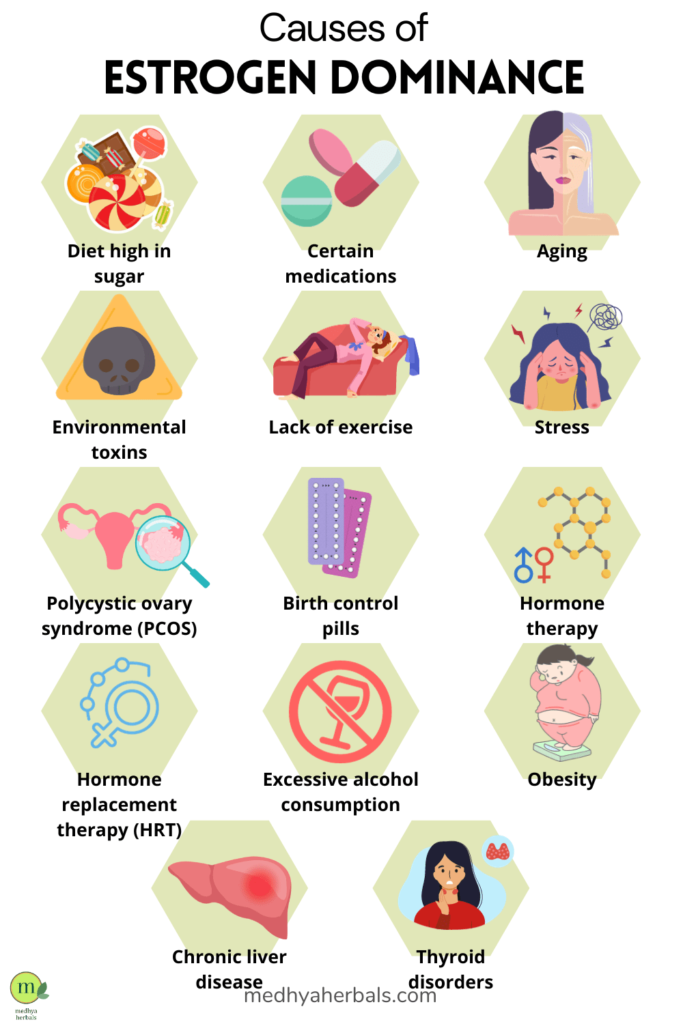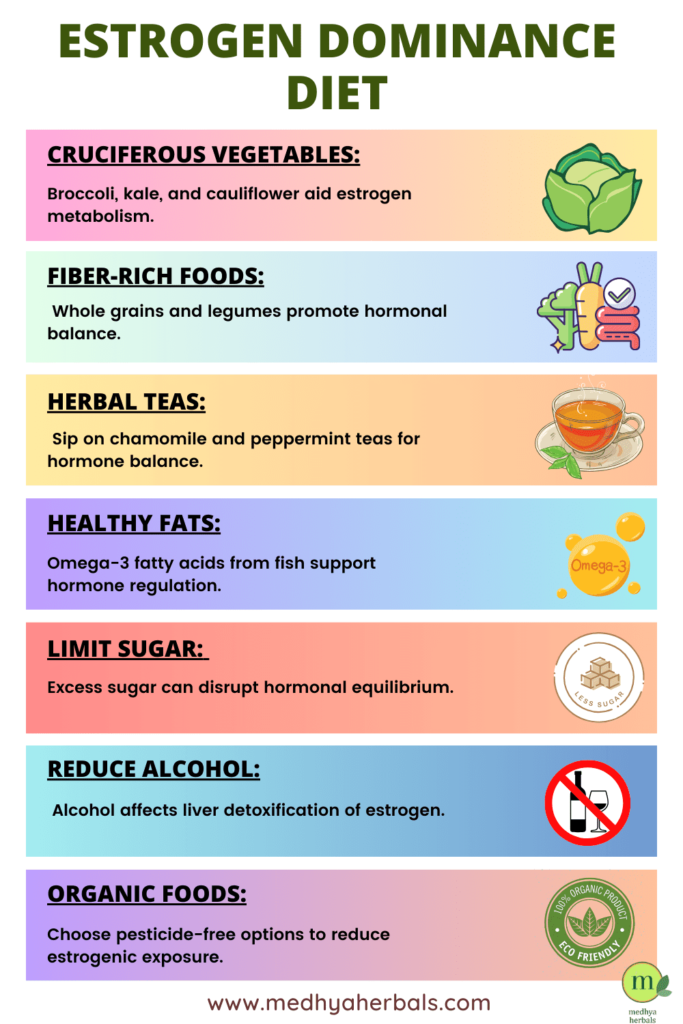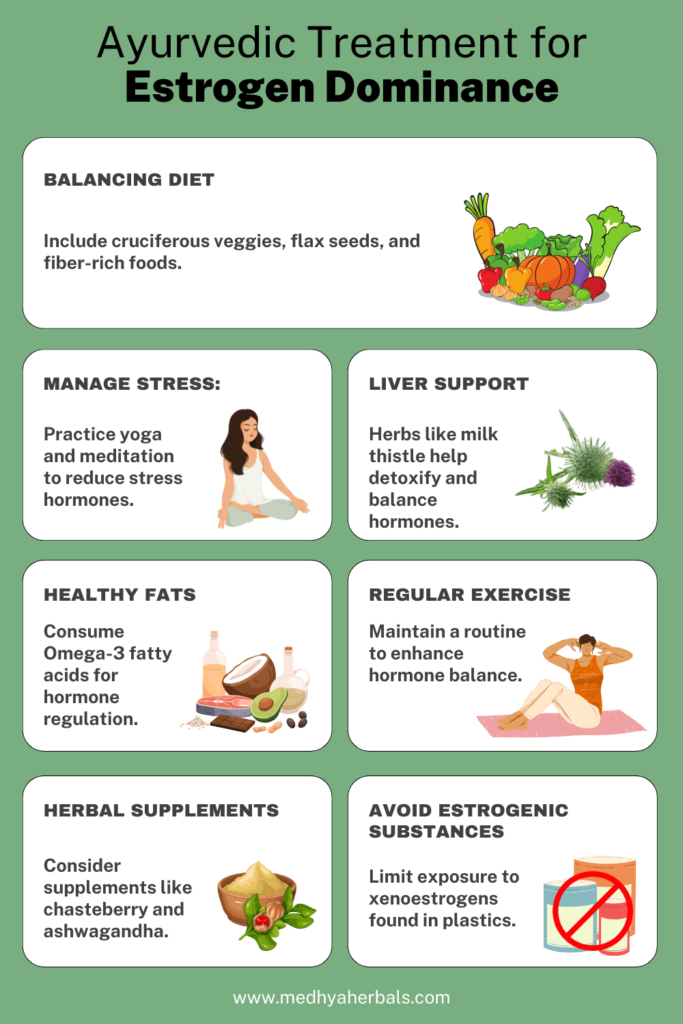Are you struggling with hormonal imbalances that leave you feeling off-kilter? You’re not alone. Hormones, like estrogen, play a vital role in your well-being. But when estrogen takes the reins and goes into overdrive, it can lead to a condition called “estrogen dominance.” This hormonal imbalance can affect your mood, fertility, and more. But here’s the good news: you can regain control with the right diet.
Imagine your hormones as tiny messengers in your body. They regulate essential functions like your menstrual cycle and mood. When these messengers get out of sync, problems can arise. Estrogen, a hormone primarily linked to women, can be a powerful force when it’s in balance. But too much can lead to estrogen dominance, causing issues like irregular periods, weight gain, and even mood swings.
In this article, we’ll break down estrogen dominance and its effects. We’ll also introduce you to the “estrogen dominance diet,” a natural approach to regain hormonal harmony. Wondering which foods can help lower estrogen levels? Curious about the foods you should avoid? We’ve got the answers you need. By the time you finish reading, you’ll be armed with practical knowledge to take control of your hormonal health. Let’s dive in and discover the foods that can help you regain balance and say goodbye to estrogen dominance.
Understanding Estrogen Dominance
Estrogen dominance is a hormonal imbalance characterized by elevated levels of estrogen relative to other hormones in the body. It’s essential to understand that estrogen isn’t inherently bad; it’s a vital hormone for women’s health. However, problems arise when estrogen levels become disproportionately high compared to other hormones like progesterone.
How Estrogen Dominance Affects Your Health?
Estrogen dominance can have a significant impact on your body. When there’s an excess of estrogen, it can disrupt the delicate hormonal balance needed for overall health. Here’s how:

- Hormonal Disruption: Elevated estrogen levels can throw off the harmony between estrogen and progesterone, leading to irregular menstrual cycles and potentially triggering conditions like Polycystic Ovary Syndrome (PCOS).
- Fertility Challenges: For women trying to conceive, estrogen dominance can hinder fertility by causing irregular ovulation or even anovulation (lack of ovulation).
- Breast Health: High estrogen levels have been associated with an increased risk of breast-related issues, including fibrocystic breast disease and an elevated risk of breast cancer.
- Mood Swings: Estrogen influences serotonin, a neurotransmitter responsible for mood regulation. Elevated estrogen levels can lead to mood swings, irritability, and even depression in some cases.

What Causes Estrogen Dominance?
Estrogen dominance doesn’t occur in isolation; various factors can contribute to this hormonal imbalance:
- Dietary Choices: Consuming a diet rich in processed foods, sugars, and unhealthy fats can lead to estrogen dominance. These foods can disrupt hormone regulation and metabolism.
- Environmental Toxins: Exposure to environmental pollutants, including pesticides, chemicals in cosmetics, and even some plastics, can contain estrogen-like compounds known as xenoestrogens, which can mimic the effects of estrogen in the body.
- Stress: Chronic stress can lead to an overproduction of cortisol, which can, in turn, affect the balance of estrogen and other hormones.
- Lifestyle Factors: Lack of exercise and poor sleep patterns can contribute to hormonal imbalances, including estrogen dominance.

How Your Diet Affects Hormonal Balance
Your diet wields remarkable power over your hormonal balance. What you eat can either promote equilibrium or throw your hormones into disarray. Here’s how your diet impacts your hormones:
- Essential Nutrients: Nutrients like vitamins, minerals, and antioxidants from whole foods play a crucial role in supporting proper hormonal function. For instance, vitamin C, Magnesium and Zinc play a role in hormone synthesis and regulation.
- Proteins and Fats: Adequate consumption of lean proteins and healthy fats can support hormone production and balance. Omega-3 fatty acids, found in fatty fish like salmon, have anti-inflammatory properties that can benefit hormonal health.
- Glycemic Index: Foods with a high glycemic index, like sugary snacks and refined carbohydrates, can cause blood sugar spikes and insulin resistance, which can disrupt hormonal balance.
- The Gut-Brain-Hormone Connection: Your gut health is intimately connected to hormonal balance. A healthy gut microbiome helps metabolize hormones effectively. Consuming probiotic-rich foods can promote gut health and hormone regulation.
- Removal of Excess estrogen: Fruits and vegetables are rich in dietary fiber, which aids in the removal of excess estrogen from the body by binding to it and facilitating its excretion.
- Antioxidants: Natural and wholesome foods as fruits, vegetables and grains in your diet contain antioxidants, such as vitamins C and E, which combat oxidative stress and inflammation, helping to maintain hormonal equilibrium. In addition, Many fruits and vegetables contain phytochemicals that can mimic estrogen or regulate its activity in the body, contributing to hormonal harmony.

Foods to Avoid with Estrogen Dominance
To combat estrogen dominance effectively, it’s crucial to know which foods to avoid. Here’s a rundown of foods that can exacerbate estrogen dominance and their effects:
- Dairy Products: Dairy from non-organic sources often contains synthetic hormones and antibiotics, which can disrupt your body’s natural hormone balance.
- Processed Meats: Processed meats like sausages and deli meats may contain added hormones and preservatives, contributing to estrogen overload.
- Soy Products: Soy contains compounds known as phytoestrogens, which mimic estrogen in the body. While moderate soy consumption can be healthy, excessive intake can lead to hormonal imbalances.
- Refined Sugars: Refined sugars and high-fructose corn syrup can lead to insulin resistance, indirectly affecting estrogen levels.
- Alcohol: Excessive alcohol consumption can strain the liver, which plays a vital role in metabolizing hormones. This can lead to estrogen buildup.
Foods That Lower Estrogen Naturally
Now, let’s explore the bright side—foods that can help lower estrogen levels naturally:
- Broccoli: Broccoli contains indole-3-carbinol, a compound that supports estrogen metabolism, helping to reduce its overall impact.
- Cauliflower: Like broccoli, cauliflower is rich in indole-3-carbinol, making it an excellent choice for hormonal balance.
- Brussels Sprouts: These little green powerhouses are packed with fiber and phytochemicals that assist in estrogen detoxification.
- Cruciferous Vegetables: Broccoli, cauliflower, and Brussels sprouts contain compounds that support the detoxification of excess estrogen in the body.
- Flaxseeds: Rich in lignans, flaxseeds can bind to estrogen receptors, reducing its impact.
- Berries: Berries are loaded with antioxidants that combat inflammation and promote hormonal balance.
- Fiber-Rich Foods: High-fiber foods like oats and legumes help excrete excess estrogen from the body.
- Healthy Fats: Avocados, nuts, and seeds provide essential fatty acids that aid in hormone regulation.
- Oranges: Oranges provide vitamin C, which aids in the synthesis of hormones and supports the immune system.
- Grapefruits: Grapefruits contain compounds that may help balance hormone levels, particularly in individuals with estrogen dominance.
- Kale: Kale is an excellent source of vitamins and minerals that support hormonal health, including vitamins A, C, and K, as well as calcium and magnesium.
- Spinach: Spinach is rich in iron and other nutrients that play a role in hormone production and regulation.
Hydration and Hormonal Balance
Maintaining proper hydration is a critical aspect of hormonal balance, and it’s often underestimated. Hydration impacts various bodily functions, including hormonal regulation. Here’s why staying adequately hydrated is essential:
- Optimal Blood Flow: Proper hydration ensures efficient blood circulation, allowing hormones to travel throughout the body effectively.
- Detoxification: Hydration supports the liver and kidneys in flushing out toxins, including excess estrogen. When the body is well-hydrated, it can efficiently eliminate hormonal waste.
- Body Temperature Control: Hormones help regulate body temperature, and dehydration can disrupt this balance, leading to temperature-related discomfort.
Drinks That Decrease Estrogen
Here are the drinks that can help you combat estrogen dominance and promote hormonal balance:
- Peppermint Tea: Peppermint tea has natural anti-androgen properties that can help regulate estrogen levels. It’s also soothing for digestive issues that may be related to hormonal imbalances.
- Green Tea: Rich in antioxidants called catechins, green tea supports liver function, aiding in the detoxification of excess estrogen.
- Dandelion Root Tea: Dandelion root tea is known for its liver-cleansing properties, assisting in the removal of estrogen from the body.
- Lemon Water: Adding a slice of lemon to your water can enhance its detoxifying properties. Lemon contains compounds that may help balance hormones.

Lifestyle Factors to Reduce Estrogen Dominance
A healthy lifestyle can help to keep your body and hormone balance in good shape. In addition, a daily routine that supports your natural detoxification systems like liver and kidneys can really help you to get rid of excess estrogen from your body naturally and regularly as required. Here are some practices that should follow along with a estrogen lowering diet as stated above:
- Exercise Regularly: Engaging in physical activity promotes circulation and helps the body eliminate toxins through sweat and improved metabolism.
- Stress Management: Chronic stress can impede detoxification processes. Incorporate stress-reduction techniques such as meditation, deep breathing, or yoga.
- Limit Exposure to Toxins: Minimize exposure to environmental toxins by choosing natural cleaning products, cosmetics, and personal care items.
- Sauna Therapy: Sauna sessions can induce sweating, which is an effective way to eliminate toxins, including some forms of estrogen.
- Milk Thistle: This herb supports liver function, an essential organ for estrogen metabolism.
- Dandelion Root: Dandelion root supplements or teas can enhance kidney function, aiding in toxin removal.Consider Supplements: If your diet lacks these vegetables, you can opt for supplements like DIM (diindolylmethane) and calcium-d-glucarate, which support estrogen metabolism.
Estrogen Dominance Diet Plan
Planning an estrogen-lowering diet can be a valuable approach for individuals seeking to manage specific health concerns related to hormone imbalances. When designing an estrogen-lowering diet plan, several major factors should be considered. These factors encompass not only the types of foods you consume but also the overall macronutrient balance, portion sizes, and lifestyle adjustments that can support your hormonal goals. The aim is to create a diet that promotes estrogen balance, aids in estrogen metabolism, and minimizes the intake of foods that may contribute to hormonal fluctuations.
General Macronutrient Ratios:
- Protein: 25-30% of total daily calories
- Carbohydrates: 40-45% of total daily calories (mainly complex carbs)
- Healthy Fats: 25-30% of total daily calories (emphasis on monounsaturated fats)
Estrogen Lowering Meal Plan
Breakfast
- Scrambled eggs with spinach and tomatoes
- 1/2 avocado
- Whole-grain toast (optional)
Mid-Morning Snack
- Greek yogurt with berries and a drizzle of honey
- Handful of almonds
Lunch
- Grilled chicken or tofu salad with mixed greens, broccoli, and sliced bell peppers
- Olive oil and balsamic vinegar dressing
- Quinoa or brown rice (optional)
Afternoon Snack
- Carrot and cucumber sticks with hummus
Dinner
- Baked salmon or tempeh with steamed asparagus and quinoa
- Sautéed kale with garlic and lemon
Evening Snack (if needed)
- Herbal tea with a few almonds or walnuts
Conclusion
We understand how challenging it can be to navigate the complexities of estrogen dominance and find lasting relief. The journey to hormonal balance may feel like a daunting task, but there is hope. Ayurveda, with its holistic approach, offers a path to permanent relief by addressing the root causes of estrogen dominance.
At Medhya Herbals, our Ayurvedic doctors specialize in tailoring personalized treatment plans that consider your unique needs and circumstances. We believe in the power of natural remedies, nourishing foods, and lifestyle adjustments to bring about a harmonious balance in your hormonal health.
Don’t let estrogen dominance hold you back any longer. Schedule a consultation with our Ayurvedic doctors today and embark on a transformative journey towards renewed well-being. It’s time to regain control of your hormonal health and live a life free from the burdens of estrogen dominance. Your path to relief and vitality starts here with Medhya Herbals.
FAQ
How do I know if I have high estrogen?
Detecting high estrogen levels in your body can involve observing specific signs and symptoms. Common indicators of high estrogen include irregular menstrual cycles, heavy or prolonged periods, breast tenderness, mood swings, and unexplained weight gain. Additionally, you may experience bloating, fatigue, headaches, and a decrease in libido. It’s essential to remember that these symptoms can vary among individuals, and a medical evaluation by a healthcare professional is crucial to confirm hormonal imbalances accurately. If you suspect you have high estrogen or are concerned about your hormonal health, consult with a healthcare provider for a comprehensive assessment and guidance on appropriate measures for diagnosis and management.
Is coffee high in estrogen?
Coffee itself is not inherently high in estrogen. However, certain factors related to coffee consumption can indirectly influence estrogen levels. Coffee can stimulate the adrenal glands, leading to increased cortisol production, which may disrupt hormonal balance, including estrogen regulation. Moreover, some coffee beans may be exposed to pesticides and chemicals, which can contain estrogen-like compounds known as xenoestrogens. To minimize potential hormonal disruptions, consider choosing organic, pesticide-free coffee options and moderate your caffeine intake, as excessive consumption may impact hormonal health. It’s important to note that individual responses to coffee can vary, and consulting with a healthcare professional about its effects on your specific hormonal balance is advisable if you have concerns.
Does green tea reduce estrogen?
Green tea contains compounds called catechins, particularly epigallocatechin gallate (EGCG), which have been studied for their potential to modulate hormone levels, including estrogen. Some research suggests that EGCG may have a mild estrogen-lowering effect by inhibiting the activity of the enzyme aromatase, which is involved in converting androgens into estrogen. However, the impact of green tea on estrogen levels is generally considered modest, and it may not be sufficient as a standalone treatment for conditions related to high estrogen.
How can I lower my estrogen levels quickly?
Lowering estrogen levels quickly can be challenging, as hormones typically respond to dietary and lifestyle changes gradually. However, there are some steps you can take to support hormonal balance. First, focus on your diet by reducing the consumption of estrogen-rich foods like soy, dairy, and processed meats, while incorporating foods that promote estrogen metabolism, such as cruciferous vegetables like broccoli and flaxseeds. Additionally, staying hydrated and engaging in regular physical activity can aid in hormone regulation. Managing stress through relaxation techniques like meditation or yoga may also help, as chronic stress can disrupt hormonal balance. Lastly, consider consulting with a healthcare professional to explore potential medical interventions or natural supplements that may assist in reducing estrogen levels effectively and safely.
References
- Clinical evaluation of Ashokarishta, Ashwagandha Churna and Praval Pishti in the management of menopausal syndrome
- Ayurveda Intervention in Perimenopausal Syndrome
- Estrogens, Migraine, and Stroke
- Estrogen Hormone Biology
- Mechanisms of Estrogen Action
- https://www.va.gov/WHOLEHEALTHLIBRARY/tools/estrogen-dominance.asp
- Estrogen-gut microbiome axis

